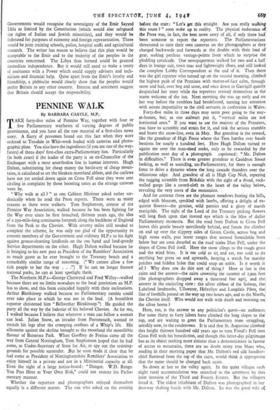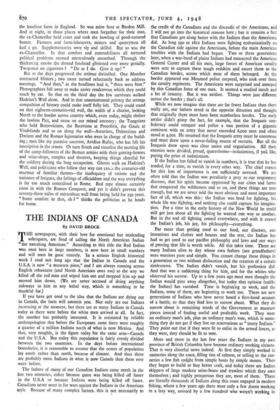PENNINE WALK
By BARBARA CASTLE, M.P.-
TAKE forty-five miles of Pennine Way, together with four or five Parliamentary wayfarers of varying degrees of public prominence, and you have all the raw material of a first-class news story. A flurry of pressmen found out this fact when they were ordered to Teesdale in Whit-week loaded with cameras and photo- graphic plate. You also have the ingredients (if you are one of the way- farers) of three days' first-class extra-Parliamentary fun. Particularly (in both cases) if the leader of the party is an ex-Chancellor of the Exchequer with a most unorthodox line in human interests. Hugh Dalton, substituting for cheap money the battle-cry of cheap moun- tains, is calculated to set the bleakest moorland ablaze, and the curlews have not yet settled down again on Cross Fell since they were sent circling in complaint by those booming tones as the strange caravan went by.
"Why walk at all ? " as one Cabinet Minister asked rather sar- donically when he read the Press reports. There were as many reasons as there were walkers. Tom Stephenson, creator of the Pennine Way Association, walked because he has been fighting for the Way ever since he first broached, thirteen years ago, the idea of a 250-mile-long continuous footpath along the backbone of England from the Peak to the Cheviot. With seventy miles still needed to complete the scheme, he was only too glad of the opportunity to commit members of the Government and ordinary M.P.s to his fight against grouse-shooting landlords on the one hand and land-greedy Service departments on the other. Hogh Dalton walked because he is bringing to his new post as President of the Ramblers' Association as much gusto as he ever brought to the Treasury bench and a remarkably similar range of reasoning. (" We cannot allow a few rich people to bar the way . . .") If he can no longer finance national parks, he can at least spotlight them. • The Northern M.P.s—George Chetwynd and Fred Willey—walked because there are no limits nowadays to the local patriotism an M.P. has to show, and this form coincided happily with their inclinations. Arthur Blenkinsop walked because no Parliamentary ramble could ever take place in which he was not in the lead. (A breathless reporter christened him "Bellwether Blenkinsop.") He guided the party all the way by the lodestar of his beloved Cheviot. As for me, I walked because I believe that wherever a man can follow a woman can lead. Julian Snow, an invader from Portsmouth, wanted .to stretch his legs after the cramping confines of a Whip's life. His silhouette against the skyline brought to the moorland the monolithic flavour of Battersea Park. When Geoffrey de Freitas came all the way from Central Nottingham, Tom Stephenson hoped that he had come, as Under-Secretary of State for Air, to spy out the training- grounds for possible surrender. But he soon made it clear that he had come as President of Nottinghamshire Ramblers' Association to enjoy himself in a private and not in a Ministerial capacity at all. Even the sight of a large notice-board : "Danger. W.D. Range. You Pass Here at Your Own Risk," could not restore his Parlia- mentary manner.
Whether the reporters and photographers enjoyed themselves equally is a different matter. The one who asked on the evening
before the start: "Let's get this straight. Are you really walking this route ? " soon woke up to reality. The physical endurance oil the Press was, in fact, the best news story of all, if only there had been someone to report the reporters. The Parliamentarians' threatened to turn their own cameras on the photographers as they charged backwards and forwards at the double with their load of gear, seeking perilous vantage-points from which to surprise the plodding cavalcade. One newspaperman walked for two and a half- days in lounge suit, town mac and lightweight sloes, and still looked the complete Lobby Correspondent at the end of it. Then there was the girl reporter who turned up on the second morning, climbed the highest peak of the Pennines with matter-of-fact calm, through snow and hail, over bog and scree, and once down in Garrigill quietly despatched her story while the reportees revived themselves in the warm welcome of the inn. Next morning she was up early and on her way before the ramblers had breakfasted, turning her attention with serene impartiality to the civil servants in conference in Wales!
Forty-five miles in three days may seem poor going to the stays at-homes, but, as one stalwart put it, "vertical miles are not horizontal ones." If you want to see the majesty of the Pennines, you have to scramble and strain for it, and risk the serious stumble and brave the snow-line, even in May. But grandeur is the reward, like the grandeur of High Force where the Tees hurtles over basalt bastions for nearly a hundred feet. Here Hugh Dalton turned to squire me over the man-sized rocks, only to be rewarded by the publication next day of a photograph. captioned: "Mr. Dalton in difficulties." There is even greater grandeur at Cauldron Snout looking, as well as sounding, un-Parliamentary, for there is enough force to drive a dynamo where the long cascade thunders over the whinstone edge. And grandest of all is High Cup Nick, repaying the tugging scramble from Birkdale with the sight of a dread, rock- walled gorge like a sword-cleft to the heart of the valley below, revealing the very roots of the mountains.
And for contrast there are the pleasant meadows footing the hills, edged with blossom, speclded with lambs, offering a delight of ex- quisite flowers—the gentian, wild pansies and a glory of marsh marigolds. The sight of the Lord of the Treasury picking flowers will long flash upon that inward eye which is the bliss of duller Parliamentary moments. But the road from Dufton to Cross Fell leaves this gentle beauty mercilessly behind, and forces the climber on and up over the slippery sides of Green Castle, across bog and high stone walls, past lesser ranges that Seemed formidable from below but are soon dwarfed as the road scales Dun Fell, under the slopes of Cross Fell itself. Here the snow clings to the rough grass and the wind bites. It is too cold to sit and eat, too cold to do anything but press on and upwards, keeping a watch for marshy patches and hidden holes that could snap an ankle. Is it worth it all ? Why does one do this sort of thing ? Here at last is the! cairn and the answer—the cairn crowning the summit of 2,900 feet (the photographers dropped away a thousand feet ago), and the answer in the encircling view: the silver ribbon of the Solway, the Lakeland landmarks, Ullswater, Helvellyn and Langdale Pikes, the line of foothills passed on the way up two hours ago, and to the North, the Cheviot itself. Who would not walk with death and morning on the silver horns ?
Here, too, is the answer to any politician's quest—an audience. For some thirty to forty bikers have climbed the long slopes to the top, and are waiting to greet the Parliamentary team straggling, untidily now, to the rendezvous. It is said that St. Augustine climbed this height thirteen hundred odd years ago to turn Fiend's Fen into Cross Fell with his benediction, and though this latter-day pilgrimage has as its object nothing more sinister than a demonstration in favour of access to mountains, there are no doubt many true blues who, reading in their morning paper that Mr. Dalton's red silk handker- chief fluttered from the top of the cairn, would think it appropriate that the name should be changed back again.
So down at last to the valley again. In the quiet villages each night rural accommodation was stretched to the uttermost by this joint invasion of the Third and Fourth Estates. But the villagers loved it. The eldest inhabitant of Duf ton was photographed in her doorway shaking hands with Mr. Dalton. So was the good wife oti
the loneliest farm in England. So was mine host at Bardon Mill. And at night, in those places where men forgather for their ease, the ex-Chancellor held court and took the bowling of good-natured banter. Farmers and farm-labourers, miners and quarrymen all had a go. Supplementaries were sly and skilful. But so was the ex-Chancellor. In that comfort and comradeliness all tortured political problems seemed miraculously smoothed. Through the thickening smoke tie domed forehead glistened ever more genially. Twopence on cigarettes ? "Do as I do. Give it up! "
But as the days progressed the retinue dwindled. One Member contracted blisters ; two more turned reluctantly back to address meetings. "And then," as the headlines had it, "there were four." Photographers fell away to make easier rendezvous which they could reach by car. So that on the third day the few survivors walked Hadrian's Wall alone. And in that unaccustomed privacy the strange compulsion of history could make itself fully felt. They could stand on that eighteen-centuries-old wall, the width of a chariot, looking North to the border across country which, even today, might shelter the lawless Pict, and muse on our mixed ancestry : the Tungrians who held Borcovicium, the Batavians at Procolitia, the Gauls at Vindolanda and so on along the wall—Asturians, Dalmatians and Dacians and the Roman legionaries who were in charge of the build- ing; men like my putative ancestor, Avidius Rufus, who has left his inscription in the stones. Or turn South and visualise the teeming life of the camp-followers of the Roman armies with their gaming-houses and wine-shops, temples and theatres, keeping things cheerful for the soldiery during the long occupation. Ghosts walk on Hadrian's Wall, and politicians who follow that way can catt.:1 the centuries-old murmur of familiar themes—the inadequacy of rations and the nuisance of fatigues, the failings of officialdom and the way everything is far too much centralised in Rome. Red tape almost certainly came in with the Roman Conquest, and yet it didn't prevent this seventy-three miles of miraculous wall from being held for 250 years. "Some comfort in that, eh ? " thinks the politician as he heads for home.



































 Previous page
Previous page